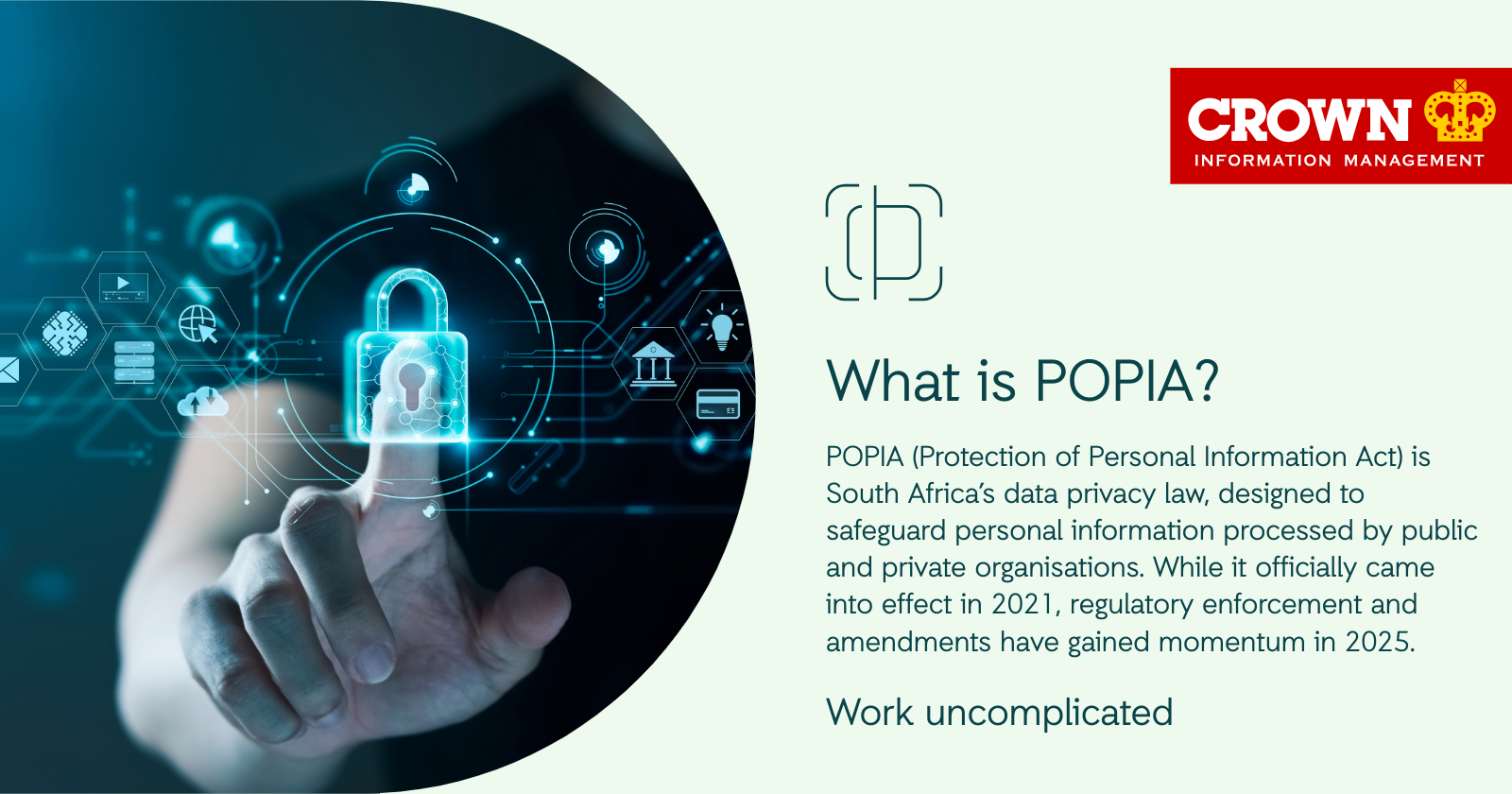-
Services
ServicesServices --
-
- Digital Solutions
- Document Scanning and Indexing
- Digital Contract Management
- Digital Invoice Processing
- Digital Mailroom
- Employee Management System (HRDMS)
- Visitor Management System (VIZIO)
- Enterprise Content Management (ECM)
- Information Consulting
- Employee Onboarding
- Central Know Your Customer Automation (CKYC)
- Digital Signatures
- Fixed Asset Management
-
- Case Studies
- Insight
- Customer Centre
If you’re running an SME in South Africa, staying POPIA compliant is more than a legal checkbox. It’s a competitive advantage.
The Protection of Personal Information Act (POPIA) has entered a new phase in 2025, bringing updates that South African SMEs must understand and act on. The stakes are high: non-compliance can result in significant fines, reputational damage, and a loss of customer trust.
In this article, we outline the five most critical changes to POPIA that every SME must know, explain the risks of non-compliance, and share how Crown Information Management can help ensure your document storage and data workflows remain secure and compliant.
TL;DR: 2025 POPIA Key Takeaways
- Stricter penalties and enforcement in 2025
- New reporting timeframes for data breaches
- Increased oversight of third-party processors
- Updated employee data handling requirements
- Cloud and offsite data storage now explicitly regulated
Need help? Talk to our compliance specialists →

-
Stricter Penalties for Non-Compliance
What’s changed?
In 2025, the Information Regulator introduced harsher penalties for non-compliance. Fines now range up to R20 million, and imprisonment terms can extend to 10 years for serious offences.
What does this mean for SMEs?
Previously, smaller businesses were less likely to be audited. Not anymore. The regulator has introduced random SME audits across sectors, especially in finance, healthcare, and e-commerce.
What you should do:
- Review and update your POPIA compliance policies
- Train staff on data handling procedures
- Ensure all personal data, physical or digital, is secured
-
Shorter Reporting Window for Data Breaches
What’s changed?
Organisations must now report data breaches within 48 hours, reduced from the previous 72-hour window.
Why does it matter?
Delayed reporting can result in steeper fines and reputational damage. More importantly, quick reporting helps affected individuals protect themselves from identity theft and fraud.
What you should do:
- Automate breach detection and alerts
- Prepare a predefined response plan
- Partner with secure cloud and workflow providers

-
New Rules for Third-Party Data Processors
What’s changed?
SMEs are now jointly accountable for any data processed by external vendors such as IT service providers, cloud platforms, and storage companies.
What implications does it have?
You can no longer claim ignorance if a third-party supplier mishandles customer data. Contracts must include clear POPIA-aligned clauses, and vendor assessments are mandatory.
What you should do:
- Audit your vendors for POPIA compliance
- Include data protection clauses in contracts
- Store physical documents with certified providers like Crown
-
Expanded Employee Data Protection Requirements
What changed?
Employee records, including leave requests, performance reviews, and biometric data, now require the same level of protection as customer data.
Why does this matter for SMEs?
Small teams often manage HR manually or via unsecured platforms, leaving personal data vulnerable.
What you should do:
- Digitise and secure employee records
- Limit access to sensitive HR files
- Use encrypted platforms for internal document handling

-
Clarification on Cloud and Offsite Data Storage
What’s changed?
POPIA now specifically addresses cloud storage and offsite document management, outlining that all hosted or stored data must reside in POPIA-compliant environments, even if stored internationally.
What impact does it have on SMEs?
If you’re using foreign-based cloud platforms or unmanaged storage units, you could be at risk.
What you should do:
- Switch to cloud providers with South African data centres or proven POPIA compliance
- Use secure, audited offsite facilities for paper records
- Document where and how your data is stored
The Risk of Non-Compliance in 2025
Beyond fines and legal consequences, the biggest risk is losing customer trust. Data breaches and compliance failures often lead to:
- Public backlash on social media
- Contract cancellations
- Loss of customer loyalty
- Internal productivity loss due to investigations
How Crown Helps Your SME Stay POPIA-Compliant
At Crown Information Management, we help South African SMEs take control of their data with end-to-end secure solutions built for compliance.
✅ Secure Storage
We offer fully audited offsite storage facilities with controlled access, fire suppression systems, and 24/7 surveillance: perfect for safely storing sensitive documents in line with POPIA.
✅ Workflow Automation
Automate your document processes, from HR files to client onboarding, to reduce human error and improve traceability.
✅ Cloud Hosting
Our cloud solutions are hosted locally in South Africa, with full encryption and POPIA-compliant safeguards. Ideal for SMEs needing secure digital access to records.

Talk to a Compliance Specialist Today
Worried about your current data processes? Not sure if your cloud provider or storage solution meets 2025 POPIA standards?
Our local team of experts can review your setup and guide you toward simple, affordable compliance.
📞 +27 11 555 5500
📧 [email protected]
FAQs: POPIA and South African SMEs in 2025
What’s the biggest POPIA risk for small businesses?
Improper storage of physical and digital documents, especially employee and customer data.
Are SMEs actually being fined under POPIA?
Yes. In 2024, the regulator issued over R4 million in fines to small businesses alone.
Is offsite document storage compliant under POPIA?
Yes, if the provider is audited, secured, and maintains full traceability. Crown’s facilities meet all criteria.
Can I store customer data with a foreign cloud provider?
Only if the provider ensures POPIA compliance and data stays within approved jurisdictions.
Final Thought
POPIA isn’t a one-time project. It’s an ongoing commitment to protecting the data that powers your business. And in 2025, that commitment is more important than ever.
Let Crown Information Management help you turn compliance into confidence, so you can focus on what you do best: growing your business.
 Bahrain
Bahrain  Cambodia
Cambodia 